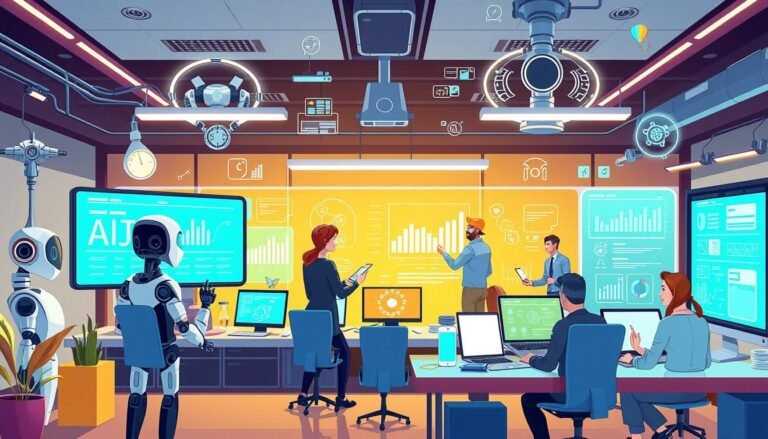Ethical Implications of AI: A Quick Overview
Artificial Intelligence (AI) is rapidly transforming multiple sectors, from healthcare to finance, and reshaping our daily lives in unprecedented ways. However, with this powerful technology comes a range of ethical implications that require careful consideration. This article explores the ethical challenges associated with AI, highlighting the potential risks and the need for responsible AI development.
1. Bias and Fairness
One of the most pressing ethical concerns surrounding AI is the potential for bias and unfairness in AI systems. AI algorithms are trained on large datasets that may contain biases reflecting societal inequalities. These biases can lead to discriminatory outcomes, particularly in sensitive areas such as hiring, criminal justice, and lending. For instance, if an AI system is trained on data that underrepresents certain demographic groups, it might make biased decisions against these groups, perpetuating existing disparities.
Mitigating bias requires developing techniques for detecting and reducing biases in AI models and ensuring that the data used to train AI is representative and inclusive. Furthermore, transparency in AI decision-making processes is crucial, allowing stakeholders to understand and challenge AI-driven outcomes.
2. Privacy Concerns
AI systems often rely on vast amounts of personal data to function effectively. This reliance raises significant privacy concerns, especially when it comes to sensitive information such as health records, financial data, or personal communications. The ability of AI to analyze and infer information about individuals can lead to intrusive surveillance, loss of anonymity, and breaches of confidentiality.
To address these concerns, it is essential to establish robust data protection regulations that govern how personal data is collected, stored, and used by AI systems. Techniques such as differential privacy, which adds noise to data to protect individual identities while still allowing for accurate analysis, are also being developed to safeguard privacy.
3. Accountability and Transparency
As AI systems become more complex, understanding their decision-making processes becomes increasingly difficult, even for their developers. This “black box” problem makes it challenging to hold AI systems accountable for their actions, especially when they make mistakes or cause harm. Without clear explanations for AI decisions, users and regulators may struggle to assess the fairness and legality of those decisions.
To ensure accountability, AI systems should be designed with transparency in mind. This includes developing explainable AI (XAI) techniques that make AI decision-making processes more interpretable. Additionally, there should be clear mechanisms for redress when AI systems cause harm, including legal frameworks that determine who is responsible for AI-driven outcomes.
4. Autonomy and Control
The increasing autonomy of AI systems raises questions about human control and the potential for AI to make decisions that impact people’s lives without human oversight. This is particularly concerning in areas like autonomous weapons, where AI systems could make life-and-death decisions independently. The delegation of critical decisions to AI systems challenges traditional notions of human agency and responsibility.
To address these concerns, it is important to establish clear boundaries for AI autonomy, ensuring that humans remain in control of important decisions, especially those with significant ethical implications. This may involve setting limits on the use of AI in certain contexts, such as prohibiting fully autonomous weapons or requiring human oversight in critical healthcare decisions.
5. Job Displacement and Economic Impact
AI and automation have the potential to significantly disrupt the labor market by displacing jobs across various industries. While AI can create new opportunities and improve efficiency, it also threatens to eliminate jobs, particularly those involving routine or repetitive tasks. This shift could exacerbate income inequality and lead to social unrest if large segments of the population are unable to find meaningful employment.
Addressing the economic impact of AI requires proactive measures, such as reskilling and upskilling programs to help workers transition to new roles in the AI-driven economy. Additionally, policymakers need to consider social safety nets, like universal basic income, to support those affected by AI-related job displacement.
6. Ethical AI Development
The ethical implications of AI extend to the way AI systems are developed and deployed. Developers, companies, and governments must adhere to ethical principles when creating AI, ensuring that the technology is used for the benefit of society and not for harmful purposes. This includes avoiding the development of AI systems that could be used for mass surveillance, manipulation, or warfare.
Ethical AI development also involves engaging a diverse range of stakeholders in the AI design process, including ethicists, legal experts, and representatives from affected communities. This collaborative approach helps ensure that AI systems are aligned with societal values and do not disproportionately harm vulnerable groups.
7. Global and Societal Implications
The impact of AI is not confined to individual users or specific sectors; it has global and societal implications. AI technologies are shaping geopolitics, with nations racing to achieve AI dominance, which could lead to an AI arms race and increased global tensions. Furthermore, the deployment of AI in surveillance and censorship by authoritarian regimes raises concerns about human rights and freedoms.
International cooperation is essential to address the global challenges posed by AI. This includes developing international agreements and norms governing the use of AI, promoting the responsible use of AI technologies, and ensuring that the benefits of AI are distributed equitably across the world.
Conclusion
The ethical implications of AI are complex and multifaceted, touching on issues of bias, privacy, accountability, autonomy, economic impact, and global stability. As AI continues to evolve, it is crucial that developers, policymakers, and society at large engage in ongoing dialogue to address these ethical challenges. By prioritizing ethical AI development, we can harness the benefits of AI while minimizing its risks, ensuring that AI serves humanity in a fair and just manner.







